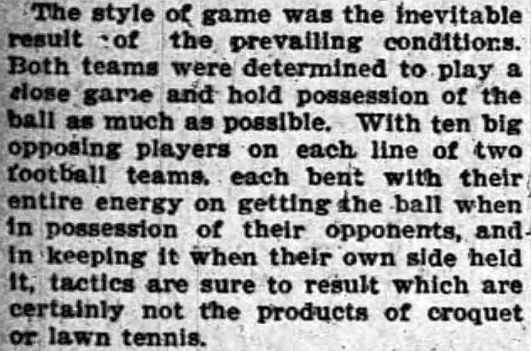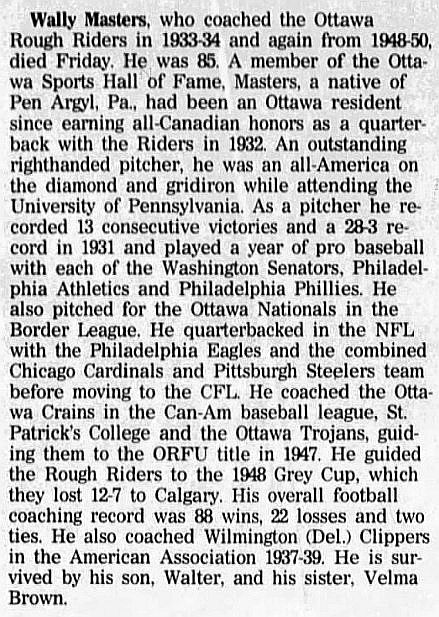One of the more interesting aspects of researching football history directly from media reports from the time is the frequency with which you find that things thought to be common knowledge are completely inaccurate or at least open to debate.
There are already several examples on this blog, none of which I deliberately sought to find. Rather, while trying to support or add to a certain claim, I instead found myself questioning it. These include...
- The CFL lists four draft choices for Ottawa in 1952 when there were at least twice that.
- Tom Clancy is often named as the Ottawa Rough Riders coach for 1904 but looking more closely into it, that seems doubtful.
- The Rough Riders are often said to have "changed names" to Senators for the 1925 and 1926 seasons but the headline announcing the team's Grey Cup victory that first year makes that claim easily questionable.

So let's stay with the name thing...
The club adopted the name Ottawa Rough Riders on Friday, September 9, 1898, and changed its team colours to red and black. Since then, red and black have been Ottawa's traditional sporting colours. Although in later years the name was said to derive from logging, the team based its colours on Teddy Roosevelt's regiment in the Spanish–American War, which, with the date of the renaming, suggests that the name also comes from the war. The team changed its nickname to Ottawa Senators from 1925 to 1930.
That's from Wikipedia and its source is the 2009 Canadian Football League Facts, Figures & Records book. One could reasonably expect it to be reliable but I think a lot of it is based on assumption.
Let's start at the beginning; The club indeed held its annual meeting on September 9th, 1898, but neither newspaper of the time, the Journal and the Citizen, makes any mention of a new name being adopted. In fact, the Journal's report's headline is "Ottawas Are Ready For Rugby". The first practice was held the following Monday and articles about that also made no mention of a new name. The Citizen referred to the team as the "Ottawa Football Club" specifically in its recap of that first practice.
Let's also bear in mind that on November 10th, 1897, the Ottawa Football Club was suspended from the Quebec Rugby Football Union for "having played roughly against (Ottawa) College last Saturday and for having been rough in the match here against McGill".
The above is from the November 11th Citizen. The match against McGill was in Montreal. McGill was believed to be pushing hard for Ottawa's expulsion (more so than "College", which was a reference to Ottawa U. ) from the QRFU and threatening to refuse to play their scheduled game in Ottawa. The Journal added that an Ottawa City player named Walters also attempted to assault officials during the game against College.
So Ottawa joins the Ontario Union instead. Problem solved. Until...
This may be the first instance of the Rough Riders name being put in use...sort of. It's not capitalized so it obviously was not an official name, it was meant more as an insult.
What prompted said insult? You'll note that this partial article is copied to Ottawa papers from the Hamilton Herald. Evidently, Hamilton media types were upset at Ottawa handing Hamilton a loss and accused them of rough play again, the very thing that got Ottawa bounced from the Quebec union less than a year earlier.
Issues of the Herald from that era are not available (at least to me, at the moment). Here's how one Ottawa paper described the game between Hamilton and Ottawa from the previous Saturday that had that Hamilton writer all riled up.

Nicely said! 😄
Before we go on, we would benefit from seeing the lineup.

The above will be beneficial when reading the summary of violence that took place on that fateful Saturday.
Hey, there's Walters again! I'm going to start thinking of him as the OG Rough Rider.
All that took place during the first match-up between these two teams, in Ottawa. It seemed as though Ottawa was mostly on the receiving end, though that may have been the local bias at work in reporting it.
Ottawa had to travel to Hamilton about two weeks later. They did so and won that contest as well.
Murderers might have been a little strong...
From that point on, the name Rough Riders comes into play frequently in the Ottawa papers. It's hard to believe that the name was decided upon at the annual meeting in September but didn't appear in a local newspaper until one of them decided to copy a Hamilton writer's article six weeks later. It seems more likely that after someone in Hamilton got his nose out of joint over the result of a game and used that term derogatively, Ottawa media (and the team) embraced the club's renegade image and ran with it. I'm reminded of the Millwall soccer club's "No one likes us, we don't care" chant, as an example.
Why did that Hamilton writer get so bent out of shape, anyway? Surely it wasn't the first time he was exposed to rough tactics while covering a game.
Oh.
As far as the mention of Roosevelt's Rough Riders goes in that Wikipedia article, I've never seen a quote or report to the effect that our Rough Riders had anything to do with his (but if do, I'll add it here). There were a great many articles about Roosevelt's RR at that time so it would have been an easy assumption to make but the names appear to be independent and with completely different meanings.


































